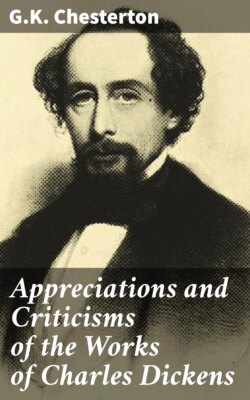Читать книгу Appreciations and Criticisms of the Works of Charles Dickens - g.k Chesterton - Страница 7
На сайте Литреса книга снята с продажи.
OUR MUTUAL FRIEND
ОглавлениеTable of Contents
One thing at least seems certain. Dickens may or may not have been socialist in his tendencies; one might quote on the affirmative side his satire against Mr. Podsnap, who thought Centralisation "un-English"; one might quote in reply the fact that he satirised quite as unmercifully state and municipal officials of the most modern type. But there is one condition of affairs which Dickens would certainly have detested and denounced, and that is the condition in which we actually stand to-day. At this moment it is vain to discuss whether socialism will be a selling of men's liberty for bread. The men have already sold the liberty; only they have not yet got the bread. A most incessant and exacting interference with the poor is already in operation; they are already ruled like slaves, only they are not fed like slaves. The children are forcibly provided with a school; only they are not provided with a house. Officials give the most detailed domestic directions about the fireguard; only they do not give the fireguard. Officials bring round the most stringent directions about the milk; only they do not bring round the milk. The situation is perhaps the most humorous in the whole history of oppression. We force the nigger to dig; but as a concession to him we do not give him a spade. We compel Sambo to cook; but we consult his dignity so far as to refuse him a fire.
This state of things at least cannot conceivably endure. We must either give the workers more property and liberty, or we must feed them properly as we work them properly. If we insist on sending the menu into them, they will naturally send the bill into us. This may possibly result (it is not my purpose here to prove that it will) in the drilling of the English people into hordes of humanely herded serfs; and this again may mean the fading from our consciousness of all those elves and giants, monsters and fantastics whom we are faintly beginning to feel and remember in the land. If this be so, the work of Dickens may be considered as a great vision—a vision, as Swinburne said, between a sleep and a sleep. It can be said that between the grey past of territorial depression and the grey future of economic routine the strange clouds lifted, and we beheld the land of the living.
Lastly, Dickens is even astonishingly right about Eugene Wrayburne. So far from reproaching him with not understanding a gentleman, the critic will be astonished at the accuracy with which he has really observed the worth and the weakness of the aristocrat. He is quite right when he suggests that such a man has intelligence enough to despise the invitations which he has not the energy to refuse. He is quite right when he makes Eugene (like Mr. Balfour) constantly right in argument even when he is obviously wrong in fact. Dickens is quite right when he describes Eugene as capable of cultivating a sort of secondary and false industry about anything that is not profitable; or pursuing with passion anything that is not his business. He is quite right in making Eugene honestly appreciative of essential goodness—in other people. He is quite right in making him really good at the graceful combination of satire and sentiment, both perfectly sincere. He is also right in indicating that the only cure for this intellectual condition is a violent blow on the head.
